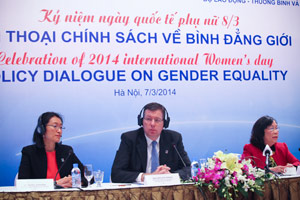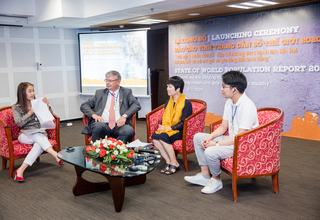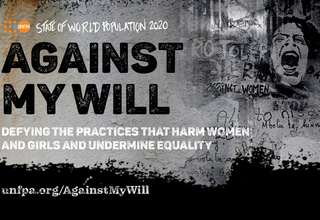Ha Noi, 7 March 2014 - The importance of gender equality in achieving progress for all was stressed today at a key policy dialogue held by the United Nations and Ministry of Labour, Invalids and Social Affairs (MOLISA) to mark International Women's Day. The event bought together over 200 participants, including policy makers, representatives from MOLISA and other ministries, the Viet Nam Women's Union, the UN in Viet Nam, bilateral and multilateral donors, as well as NGOs and the media.

Reflecting on the progress for women and girls towards achieving the Millennium Development Goals (MDGs) in Viet Nam so far, the half-day meeting examined ways to accelerate progress towards to reaching the MDG targets by next year's deadline. Participants also stressed importance of striving for gender equality in formulating a new generation of sustainable development goals and the post-2015 development agenda.
Viet Nam's remarkable MDG progress, for example in reducing poverty and achieving gender parity in primary school attendance was fully recognized in the discussion. Participants identified obstacles in promoting the rights of women and girls cross the country. Achieving equality for women and girls is not only a matter of fairness and fundamental human rights, but also critical. Progress in many other areas, for example in economic growth, health, education, anti-discrimination and child support depends on it.
Opening the event, H.E Mme Pham Thi Hai Chuyen, Minister of MOLISA and Chairperson of the National Committee for the Advancement of Women in Viet Nam stressed "The dialogue today helps Viet Nam examine ways to accelerate progress in the implementation of the MDGs for gender equality and contribute to the agenda of the 58th Session of the Commission on the Status of Women".
Speaking at the dialogue, Mr. Arthur Erken, UNFPA Representative/ United Nations Resident Coordinator in Viet Nam said "We stand at a critical point in time for women and girls. We cannot afford to lose any ground on gender equality and women's rights. Equality for women and girls is not just a dream. It is a duty of governments, the United Nations and everyone around us." In the presentation, the UN in Viet Nam provided an overview of MDGs progress in Viet Nam, including major gender gaps in their achievement, and conveyed key recommendations to place Gender Equality at the heart of the Government planning and the post-2015 development agenda. At the event, MOLISA presented priorities to promote the implementation of National Strategy and National Programme on Gender Equality toward achieving MDGs in Viet Nam.
During the event, key research findings were shared by the Viet Nam Women's Union and the Institute of Family and Gender Studies. Their work provided evidence and practical experiences for the Viet Nam's government and the UN in Viet Nam to promote gender equality of all groups for example ethnic minority women and girls, women with disability; and to prevent and end violence against women and girls.
Closing the event, MOLISA and the UN both remain committed to working together to support the effective implementation of the National Strategy for Gender Equality (2011-2015) and reparations to the National Programme on Gender Equality (2011-2015) , to review The Beijing+20 and the Beijing Platform for Action and above all to ensure an equal society for women and men.



